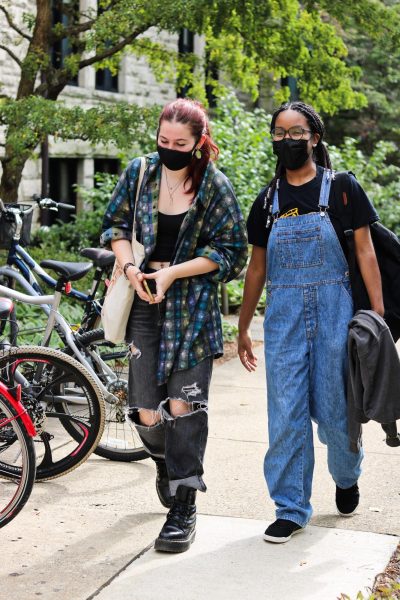SASA Rings in Diwali Celebration with Unique Gusto
On my third Diwali at Oberlin, I had one of the best Campus Dining Services dinners in my three years on campus. Diwali is the Hindu festival of lights, a celebration of the triumph of good over evil in the battle between Lord Ram and the demon Ravana. Stevenson Dining Hall exceeded all expectations last Wednesday with their Diwali-themed vegetarian/vegan station featuring chana masala, yellow basmati rice, and paneer butter masala. Particularly in the absence of the India Garden restaurant, this meal was surprisingly soul-satisfying, abetting some of the homesickness I feel this time of year.
Despite having past experiences with perhaps unintentionally appropriating international cuisines, CDS went about Diwali the right way. Eric Pecherkiewicz, Oberlin’s campus dietician, reached out to South Asian Student Association members asking for our input on the menu, recipes, and titles, which resulted in the first time I had a somewhat authentic South Asian meal at a CDS dining hall. I was especially delighted that they successfully recreated the Sooji ka Halwa dessert item.
I’d like to thank CDS for their initiative and hope we will see them collaborate more with other cultural organizations in semesters to come. This respectful display of our culture garnered massive support from all of SASA as we united in one of Stevenson Dining Hall’s private rooms to eat together Wednesday night. Granted, some of us felt like the red chili powder and salt proportions had been tampered with, but I am prepared to let it go.
After spending the first 17 years of my life in a Hindu household in North India, I took Diwali celebrations for granted. It was only after coming to Oberlin that I felt the need to recreate my Indian experiences in a foreign country. For the past two years, SASA has celebrated Diwali at Lewis House, which houses the Office of the Ombudsperson and Religious and Spiritual Life. We dress up, dance, cater food, and burst firecrackers — each time it is a great community bonding experience, particularly with the Campus Safety car that circles the house every half-hour, squinting their eyes disapprovingly at the crackers.
However, each year, we have deliberately celebrated only the secular, cultural aspects of Diwali at Oberlin, in an effort to prevent any discomfort among members. This never bothered me, because the secular aspects were the only parts that mattered to me when I was in India, though my family also adhered to the religious traditions of the holiday. But in Oberlin, I feel the void of my mother singing prayers, the incense, and the rituals that I’ve unconsciously associated with the festival my entire life. Diwali doesn’t feel the same without my grandmother telling me the same religious stories over and over again, reprimanding me when I touch the food before it is offered to the idols, and then placing oil lamps on every entrance of our home to invite in Laxmi, the goddess of prosperity. I’ve celebrated two years of Diwali without folding my hands together even once, or thinking about the origin of the day at all.
So this year we are trying something different. SASA is celebrating Diwali today and tomorrow at Lewis House and, for the first time in my memory of the organization, we will be performing an all-inclusive, non-required, Hindu puja or prayer ceremony. While Saturday will be the same Diwali we all know and love, I am excited to have the opportunity to share the religious traditions of the festival on Friday.
My desire to engage with the more religious side of my culture is strange and unsettling, because it doesn’t come out of a sense of duty, familial pressure, or a particular inclination toward gods or Hinduism. This prayer is just a part of the day for me. An aspect I think is important to share, a legacy I don’t want to forget.
Besides, whether or not the Hindu interpretation of life is true, it couldn’t hurt for Obies to pray for prosperity given our current financial situation. Happy Diwali!




